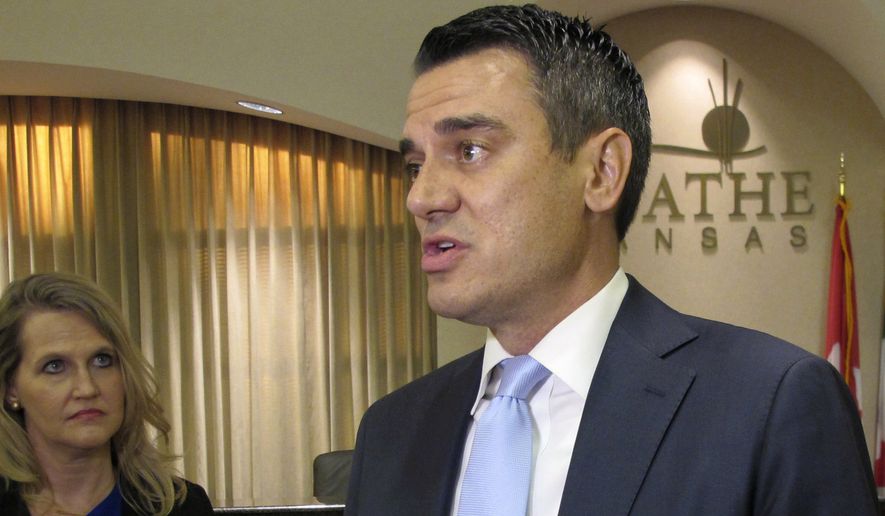The House Appropriations Committee on Wednesday passed its 2019 spending bill that funds the Department of Homeland Security, provides about $5 billion for border security efforts — including President Trump’s desired U.S.-Mexico border wall — and includes several checks on the administration tied to the ongoing child separation crisis at the border.
The committee approved the bill, which includes $51.4 billion in base discretionary spending for DHS and an additional $6.7 billion for disaster relief, on a 29-22 vote.
The House’s homeland security spending bill is the last of the 12 annual funding bills to clear the appropriations committee, and has been one of the most contentious amid the toxic immigration debate going on in Washington.
Republicans said the new wall money — which is supposed to fund more than 200 miles of new physical barrier construction — is necessary to support the “three-legged stool” of border security involving barriers, technology, and manpower.
“I encourage anyone who would characterize a single piece of of this three-part strategy as anything less than mission critical to further investigate,” said Rep. Kevin Yoder, Kansas Republican and chairman of the homeland security spending subcommittee.
The White House has cheered the $5 billion figure, which is well above the $1.6 billion Senate appropriators included for border fencing in their 2019 homeland security spending bill.
Democrats, meanwhile, said they oppose not only the wall funding, but the bill’s $7.4 billion spending level for Immigration and Customs Enforcement (ICE) that envisions the hiring of hundreds of additional officers and 44,000 detention beds - 3,480 more beds than in the current year.
“The unnecessary…infrastructure funding and the ICE enforcement and removal funding, including the detention beds, are what primarily preclude Democrats from supporting this bill,” said Rep. Lucille Roybal-Allard, the top Democrat on the homeland security spending subcommittee.
Democrats and Republicans did come together Wednesday to support several provisions to mitigate some of the fallout from the child separation crisis at the border, as the Trump administration faces a Thursday deadline to reunite many of the parents who have been separated from their children.
A broad-based amendment introduced by Mr. Yoder directs the Department of Homeland Security’s inspector general to report back within 30 days on interagency coordination, efforts to reunify families, and President Trump’s executive order intended to halt family separations at the border.
It also says siblings should be placed in the same facilities when possible and prevents funds from being used to block members of Congress from entering the facilities to inspect them.
The committee also adopted an amendment offered by Mr. Yoder and Ms. Roybal-Allard that, among other provisions, makes more funding available for mental health services for children being held in federal custody.
Lawmakers also weighed dozens of other amendments Wednesday from members of both parties.
The committee approved an amendment from Rep. Robert Aderholt, Alabama Republican, that says federal funds can’t be used to perform abortions for women in ICE custody.
Lawmakers also approved Democratic amendments that would prevent federal funds from being used to deport DACA recipients, would zero out funding to implement the administration’s new restrictions on asylum seekers, and would prevent the shackling of pregnant women in federal custody.
The committee did turn aside a push from several Democrats to restrict federal immigration enforcement agencies from conducting raids within 1,000 feet of public locations like schools and courthouses and to hold level the number of detention beds.
With the Wednesday vote, the House and Senate appropriations committees have now approved all 12 of their annual funding bills for the budget year that starts Oct. 1. The full House has passed six of its 2019 spending bills and the Senate has passed three.
Lawmakers are trying to get all of them done before Sept. 30 to head off a potential shutdown showdown and to avoid the need for another stopgap funding bill, though the House starts its five-week summer break next week and won’t be back until after Labor Day.
Senate Majority Leader Mitch McConnell has shortened that chamber’s August break in part so senators can continue to work on next year’s spending bills.
The Senate this week is considering another “minibus” package that couples four more spending bills covering the areas of agriculture, the interior/environment, financial services and general government, and transportation.
• David Sherfinski can be reached at dsherfinski@washingtontimes.com.




Please read our comment policy before commenting.